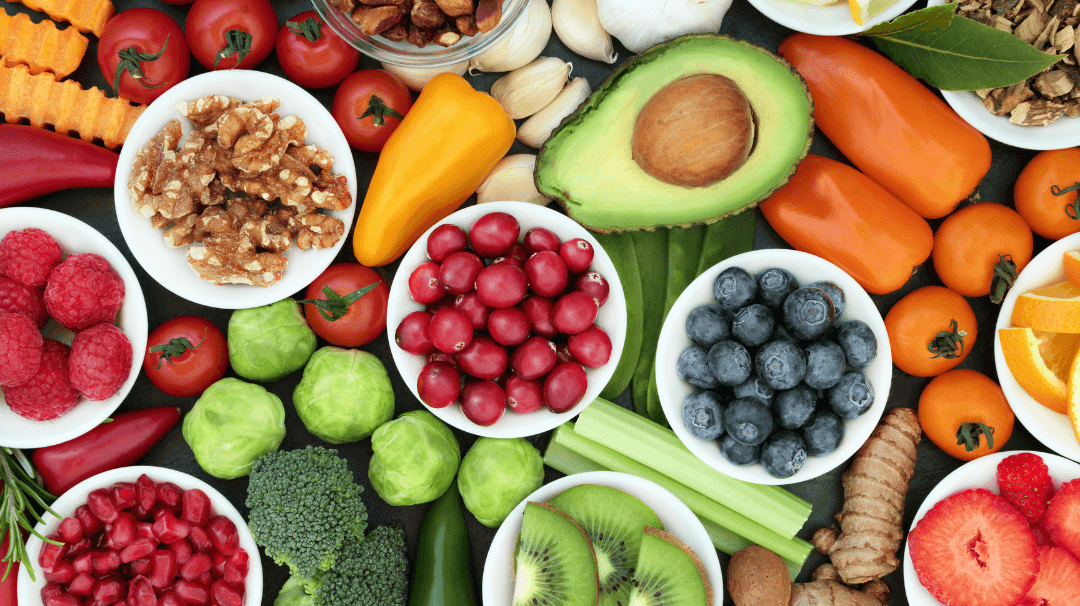Food plays a multifaceted role in our mood and mental well-being, encompassing what we eat, how we grow and prepare our food, our dining habits, and even the emerging science behind the gut-brain connection. Let’s explore these facets and highlight the importance of a holistic approach to nutrition for mental health.

What We Eat
The food we consume has a significant influence on our mental health. What we put into our bodies can have a profound effect on how we feel and think. Research indicates that our dietary choices can either promote or hinder mental well-being.
According to Sutter Health, “Eating Well for Mental Health” is a crucial aspect of maintaining emotional balance and cognitive function. Nutrient-dense foods rich in vitamins, minerals, and antioxidants are essential for promoting a healthy brain and emotional stability. A balanced diet with an adequate intake of fruits, vegetables, lean proteins, and whole grains can have a positive impact on mood and cognitive function, as supported by various studies and clinical evidence.
The Canadian Digestive Health Foundation has identified specific foods that can influence our mental well-being. For example, omega-3 fatty acids found in fatty fish, flaxseeds, and walnuts have been linked to improved mood and reduced risk of depression. Additionally, probiotics, found in fermented foods like yogurt, kefir, and kimchi, can positively affect gut health and subsequently improve mental health.
Harvard Health explains the emerging field of “Nutritional psychiatry” which focuses on the intricate relationship between what we eat and how it affects our mental health. This perspective emphasizes that food isn’t just fuel; it’s information for our brain and has a direct impact on mood, behaviour, and overall mental health.

Gut-Brain Connection
The gut-brain connection has emerged as a fascinating area of research in understanding the intricate relationship between our gut and our mental health. This connection, often referred to as the “second brain,” underscores the profound impact of our gut microbiome on our mood and behaviour.
The connection between the gut, mood, and behaviour is related to the gut microbiome; a complex ecosystem, with various microorganisms that can influence our brain functions and mental health. A balanced gut microbiome supports mental well-being.
Improving your gut health, in turn, enhances your mental health. The role of a diet rich in fibre, fermented foods, and prebiotics in promoting a healthy gut cannot be understated as to positively affect your mood and mental state.
Psychology Today Canada underscores the significance of the gut-brain connection. This relationship can influence conditions like anxiety, depression, and even neurodegenerative diseases. A healthy gut contributes to a healthier mind, which is a reminder of the intricate interplay between our digestive system and mental well-being.

How We Eat
The manner in which we approach our meals and our relationship with food are equally important in maintaining good mental health. Mindful eating and cooking play a crucial role in fostering a healthy mind.
Preparing your meals allows you to have control over what you eat and can be a meditative and satisfying experience. It can also enhance self-esteem and provide a sense of accomplishment, contributing to better mental health.
Mindful eating involves a mental sense of being present during meals, and paying attention to flavours, textures, and the experience of eating. This practice can help individuals develop a healthier relationship with food, promoting positive mental well-being.
The American Heart Association provides an informative infographic on mindful eating, further illustrating the principles and benefits of this approach to food. It encourages a greater awareness of your food choices and helps you make healthier decisions.
Headspace, a mindfulness platform, emphasizes the importance of “Mindful Eating”. It encourages mindfulness during meals to reduce overeating, increase satisfaction, and improve the overall dining experience. Mindful eating can help reduce stress and promote better mental health.

Eating Communally When Possible
In a society that increasingly values convenience and quick meals, communal dining experiences have taken a backseat. However, eating together with others can have a positive impact on mental health.
This knowledge highlights the psychosocial benefits of cooking interventions. While the specific impact on mental health needs more research, these interventions provide crucial social interaction and support.
Cooking together can foster social bonds, reduce feelings of isolation, and provide a sense of accomplishment. These aspects contribute to improved mental health.
Healthy cooking classes are a great approach to healthy and communal eating! These classes not only teach participants about nutritious food but also create a sense of community and belonging. Such experiences are invaluable for promoting mental well-being.

Food can affect your mood in various ways
The food we eat, the way we eat, and our social dining experiences all play a vital role in our mental health. The research continues to unveil the intricate connections between our diet and well-being, particularly through the gut-brain connection.
To improve our mental health, it’s essential to be mindful of our dietary choices. Develop a positive relationship with food, and engage in communal dining experiences whenever possible. By doing so, we can take a holistic approach to nourishing both our bodies and minds, ultimately leading to improved mental well-being.
Eli’s Place will be a rural, residential treatment program for young adults with serious mental illness. To learn more about our mission and our proven-effective model click here.




